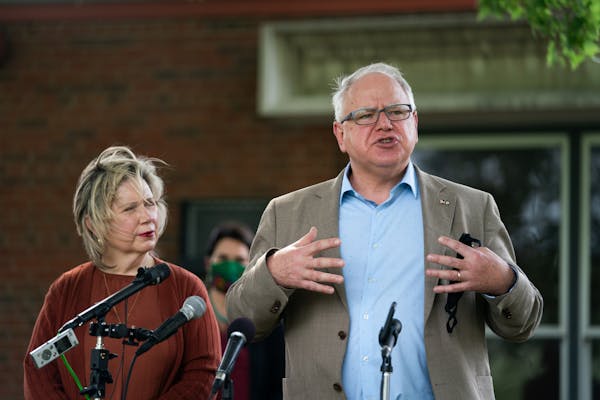Senate Republicans ousted Minnesota Commerce Commissioner Steve Kelley on Friday, the second agency head in two months to get the boot in an intensifying power struggle between GOP leaders and Gov. Tim Walz during a series of pandemic-triggered special sessions.
Kelley, appointed by Walz in 2019, was rejected on a narrow 33-31 vote after taking heat from Republicans for his agency's role in legal challenges to Line 3, Enbridge Energy's project to replace a deteriorating pipeline in northern Minnesota.
Kelley's ouster follows that of former Department of Labor and Industry Commissioner Nancy Leppink, whose nomination was rejected during a special session in August by Republicans citing some of her regulatory decisions during the COVID-19 pandemic.
Taken together, the two moves represent an extraordinary use of the Legislature's power to confirm or reject the governor's cabinet appointments, now being wielded as a weapon during the continuing standoff over the governor's use of emergency powers to combat the spread of COVID-19.
Republicans said the move did not stem from their differences with Walz over the pandemic. But Democrats decried both votes as election-year politics that would only hamper the administration's ability to respond to the ongoing pandemic.
"My administration, my commissioners, are fighting COVID every day, doing the best we can to protect Minnesotans," Walz said after the vote. "I certainly wish I could get a little bit of help from the Legislature on that."
Only the Senate can deny the governor's commissioners but the chamber rarely wields that power, rejecting only two appointees between 2008 and 2019.
The vote to oust Kelley wasn't entirely party line. Two northern Minnesota DFL senators — Tom Bakk and David Tomassoni — voted against Kelley's confirmation. Sen. David Senjem, R-Rochester, voted with Democrats.
Tensions have been rising between the parties for months over the state's response to the pandemic, with Republicans in the House and Senate pushing Walz to relinquish the emergency powers he's used to close down businesses, schools and churches while requiring people to wear face masks in indoor public places.
Lawmakers were automatically gathered for the fourth special session of the year Friday, triggered by another 30-day extension of Walz's emergency powers to respond to the pandemic. Republicans in the Senate voted to end the state of emergency, but a similar motion was defeated in the DFL-controlled House.
"We need these powers for this pandemic because the emergency has not passed," said House Speaker Melissa Hortman, DFL-Brooklyn Park. "House DFLers will continue to work with Governor Walz to address the pandemic, to keep people safe and to rebuild the economy."
Their argument that election-year politics were at play was bolstered by an e-mail from Rep. Jon Koznick, R-Lakeville, accidentally sent to the entire House DFL caucus during the debate over emergency powers.
"A friendly, reminder (as discussed in caucus) to stay on message IF you speak today," Koznick wrote. "COVID issues are not our winning message. PUBLIC SAFETY is our ticket to the majority, let's win with that."
The e-mail was immediately blasted by DFL Party Chairman Ken Martin, who called it "disgraceful and shameful" partisan politics.
"It's appalling that, during a special legislative session to combat COVID-19, Republican leadership warned their lawmakers to avoid discussing the virus entirely because it was not a winning issue for them politically," he said.
But Senate Majority Leader Paul Gazelka, R-East Gull Lake, said the move against Kelley was in the works before the pandemic hit. He said he'd had several meetings about Kelley earlier this year to express GOP concerns over his leadership. He added that Republicans had planned to reject Kelley's nomination earlier but held off because of the coronavirus and the civil unrest following the Minneapolis police killing of George Floyd in May.
Republicans became more frustrated with Kelley in August, when the Commerce Department announced it would appeal a state utility regulator's approval of the Enbridge Line 3 pipeline project, which has sparked environmental concerns.
Gazelka said he also is still working to negotiate a public infrastructure borrowing package of more than $1.3 billion that House Republicans have tied to ending Walz's emergency powers.
The Department of Commerce is charged with helping to regulate industries such as insurance, energy and telecommunications. Republicans argued the agency's Line 3 appeal was an affront to rural Minnesotans who need the jobs it would create.
"What does that say to rural Minnesota? Does that just tell us that we are a bunch of rocks and cows up there?" said Sen. Mark Johnson, R-East Grand Forks. "By doing this appeal, that's thumbing their nose at rural Minnesota. That is not the leadership we need."
While rejecting Kelley, the Senate confirmed Friday the appointment of Bureau of Mediation Services head Janet Johnson and Joe Sullivan, the newest member of the Public Utilities Commission.
"The governor appoints commissioners, but it's our responsibility to either confirm or not confirm," Gazelka said. "Anytime there's a decision to not confirm, it is not taken lightly."
Former DFL Senate Majority Leader Kari Dziedzic dies of cancer at age 62

How the Star Tribune is covering the 2024 election

Fact check: Walz and Vance made questionable claims during only VP debate

In Tim Walz's home city, opposing groups watch him debate on the national stage

